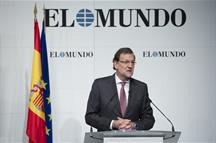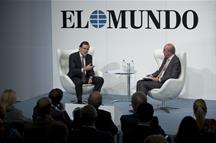"Those intending to ignore the law do so because they lack the popular support to change it", says Mariano Rajoy
President's News - 2015.11.4
1. Images of President Rajoy in the forum entitled 'The Necessary Spain' organised by the daily newspaper El Mundo | Pool Moncloa - 2015.11.4
Teatros del Canal, Madrid
In his speech, the President of the Government referred to the situation in Catalonia as "the greatest challenge faced by our constitutional order and the nation of Spain in decades". He went on to say that there is nothing that "justifies the position of constant disloyalty and defiance adopted by those in leadership within the Regional Government of Catalonia for some considerable time".
Loyal conduct based on solidarity by the Government of Spain
Mariano Rajoy stressed that Spain stands as a fine example of decentralisation, which has allowed Catalonia to have the "highest level of self-government" in its entire history. He also recalled that, "since the start of this legislature", the Regional Government of Catalonia has had problems in paying its pharmacies, servicing its debts as they matured and paying salaries to its civil servants.
"In order for the welfare system for the citizens of Catalonia not to collapse", explained the President of the Government, the Government of Spain implemented a number of initiatives: "the State has allocated 49 billion euros through the various financial support mechanisms" since 2012.
Sufficient mechanisms are in place
 Pool Moncloa / Diego CrespoThe President of the Government stressed that, in spite of "this loyal conduct based on solidarity", the Regional Government of Catalonia "has focused all its energy on implementing initiatives that go against the principle of co-existence and the Spanish Constitution".
Pool Moncloa / Diego CrespoThe President of the Government stressed that, in spite of "this loyal conduct based on solidarity", the Regional Government of Catalonia "has focused all its energy on implementing initiatives that go against the principle of co-existence and the Spanish Constitution".
At any event, Mariano Rajoy said that, although "we have never had to employ them to date", the "State also has sufficient mechanisms to tackle this situation".
As regards the round of meetings held recently with the various political forces, the President of the Government said that "there is basic consensus from almost all of them" on four fundamentally key areas: the unity of Spain; the sovereignty of the Spanish people; equality of all Spaniards; and respect for the law.
In this regard, the President of the Government added that the greatest possible consensus is "that which guarantees our harmonious co-existence, protects our diversity and reflects the opinion of the vast majority of Spaniards" because, he added, "the only democracy worthy of that title is one based on respect for the law".
Spain of the future
Mariano Rajoy said that both "institutional or political uncertainty" and "a project aimed at splintering our constitutional order" are factors that work against economic growth and job creation.
In his opinion, the Spain of the future must be "a flexible, innovative Spain that is fully dynamic and capable of keeping up with the pace of change and even anticipating it". Even though the Spanish economy has made great progress in recent years in terms of competitiveness and flexibility, it is still "not enough". Therefore, there is a need for "greater ambition, more reformist commitment, greater quality in education, increased global presence and easier entrepreneurial activity in all areas of business".
Creating 500,000 jobs per year
The President of the Government reiterated that the goal is still to return to a figure of 20 million Spaniards in work, meaning that 500,000 jobs will have to be created in each of the next four years. As he explained, this goal can be achieved if "the reformist drive" is maintained and efforts continue to encourage new hirings by supporting stability and improving employability.
In this regard, Mariano Rajoy said that "employment stems from reforms, innovation, competitiveness and a healthy economy".
The Digital Agenda
 Pool Moncloa / Diego CrespoFor the President of the Government, the digital economy and the single market must drive the Spanish and European economies. Within this context, the Digital Agenda has a fundamental role to play, as highlighted by the European Council in June.
Pool Moncloa / Diego CrespoFor the President of the Government, the digital economy and the single market must drive the Spanish and European economies. Within this context, the Digital Agenda has a fundamental role to play, as highlighted by the European Council in June.
He explained that the Digital Agenda must be developed in four directions: the digital platforms (involving Spanish companies); respect for constitutional rights; taxation; and the protection of intellectual property.
The President of the Government recalled that the Digital Agenda also has an "undeniable role" to play in improving our education system. He referred to the school connectivity plan based on ultra-fast broadband that the Government of Spain recently implemented: 330 million euros to benefit 16,500 education centres and 6.5 million pupils throughout Spain.
In terms of education, the President of the Government highlighted the recent reforms, such as the Constitutional Law on Education Quality (Spanish acronym: LOMCE) and the new Vocational Training system, and spoke about others that are in the pipeline, such as the White Paper on the Role of Teachers and the new Spanish Strategy for Higher Education (for making universities more competitive).
He went on to explain that the education system must improve because social cohesion and equal opportunities "for all Spaniards" depends on it.
New autonomous region financing system
Mariano Rajoy also said that economic improvement is necessary for "guaranteeing our Welfare State" and "ensuring coverage under conditions of equality and quality for all citizens".
He explained that these are the two pillars guiding the Government of Spain's proposal for a new autonomous region financing system and the fiscal reform, two issues that "absolutely must go hand-in-hand".
Furthermore, the President of the Government said that continued progress on the public administration reform is "fundamental" for achieving "maximum efficiency" because "this will also help improve the quality of public services and our well-being".
Round of questions
 Pool Moncloa / Diego CrespoDuring the round of questions that followed the speech by the President of the Government, Mariano Rajoy announced that, if the Parliament of Catalonia eventually approves the resolution to launch a process to create an independent Catalan State, the Government of Spain will appeal to the Constitutional Court "the very next day". In this regard, he said that "the Government of Spain has never ignored its responsibilities, and is not about to do so now".
Pool Moncloa / Diego CrespoDuring the round of questions that followed the speech by the President of the Government, Mariano Rajoy announced that, if the Parliament of Catalonia eventually approves the resolution to launch a process to create an independent Catalan State, the Government of Spain will appeal to the Constitutional Court "the very next day". In this regard, he said that "the Government of Spain has never ignored its responsibilities, and is not about to do so now".
When asked about the Regional Liquidity Funds (Spanish acronym: FLA) allocated to Catalonia, Mariano Rajoy explained that debt maturities do not pass through the Regional Government of Catalonia but are rather assumed by the State, which pays suppliers directly after an invoice is submitted.
On the issue of corruption, Mariano Rajoy stated that the Public Prosecutor's Office, the courts, the Tax Office and the Customs Surveillance Service "have acted entirely independently". He also mentioned the approval during this legislature of "an unprecedented and very important legislation package". The latest decision by the Government of Spain in this regard, he said, was to create an Office for "recovering the fruits of criminal activity". "We have taken many decisions and I am absolutely convinced that all of them will bring about results in the future. At any event, I think this is an area where I should have been more diligent", he said.





